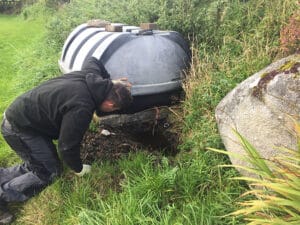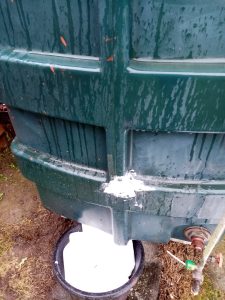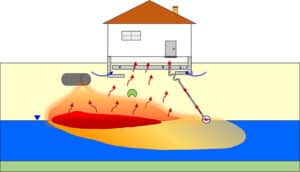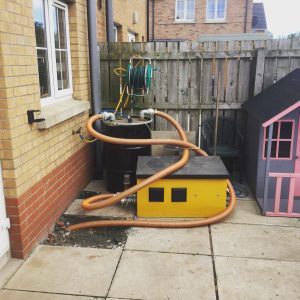Strange smell in your home
What can it smell like
Do you have a strange smell in your home? An unaccounted for odor that you just cannot explain? Do you think the odor reminds you of thinners, solvents, polish?
These are often what people experience when they have had an oil spill. Home heating oil rarely smells the way you think it should when it has been spilled.
Reasons for this are that spilled home heating oil will change as it moves through the ground. Oil is not just one substance, rather it is a complex mixture of molecules of different sizes and shapes. Smaller and less bulky molecules will migrate faster through the soil, whilst larger more complex molecules get heled up in the soil.
In addition to the above there is volatility to consider. Smaller molecules are far more likely to evaporate and become gases / vapors which we can smell. Conversely, larger heavier molecules will have very low volatilities and we are likely not to see these in gas / vapor form at all.

Strange smells in your home? This might be to blame
Shortly after a spillage of home heating oil the smallest components of the oil are likely to have largely volatilized and become gas. Given time or distance from the point of escape these will evaporate and escape to the atmosphere and if remeasured the profile of molecules in the air will have changed and there will be a slightly different odor.
What should I do if I have a strange smell in my home?
Investigate!!!!
If you have oil fired central heating start there. Look at your tank first, make sure:
- Make sure the fittings aren’t leaking
- Make sure your tank isn’t leaking, pay particular attention to the underside and seams.
- Make a note of the level on your tank gauge. Check it again every hour. This will give you an idea if you below ground supply pipe is leaking.
- Check your boiler fittings.
- There is lots of local government advice out there such as from NI Direct.

A leaking oil tank might be the reason for a strange smell in your home.
If you don’t have oil fired central heating, do your neighbors? You might need to start with them. Most likely they won’t even know they are having a leak and the best manner in which to approach this is to be calm and indicate that you only want to help. Lets face it, they won’t want to be having an oil spill anymore than you.
Still a strange smell in your home? So what now?
Ok, you have found the leak either on your property or at a neighbors, so what next?

This won’t fix your problem, but it will definitely stop it getting worse.
Stop it getting worse
This one should be obvious, but it is imperative that you or your neighbor move heaven and earth to prevent a small oil spill becoming a large oil spill. In terms of impact, cost, aggravation and legality you have an obligation morally and in many cases legally to prevent a worsening of events.
- Shut off the oil supply valve at your / neighbors tank.
- If the tank has split slightly, then rub a bar of soap into it (then get help)
- If the tank has a major leak call for help, you will need a specialist contractor.
- But once this has been done go back outside and find containers to catch as much oil as possible.
- If you have a spade at hand use it to dig containment trenches or sumps. This will really slow down any migration.
- If there are drains nearby or they run through the area below ground its a good idea to block these with whatever you have at hand. This will slow down any migration offsite that might impact a watercourse.
Stressful? These things tend to happen when you are least expecting it, at night and in poor weather conditions. Get as much help as you can from friends and family as we know things can be overwhelming. When a specialist contractor arrives they will know exactly what to do.
What does it mean when I can smell oil in my home?
If you already have a strange smell of oil in some rooms of your home it doesn’t necessarily mean that oil is below your home. Earlier we discussed how the smaller molecules in home heating oil evaporate.
Now imagine if this happens that these molecules which are now a gas moving rapidly through cracks and pores in the soil. They also migrate along pipes (inside and out) and can readily diffuse through masonry. Often they collect in void spaces and these can be:
- Basements
- Ventilation crawl spaces where you have suspended floors.
- Even the spaces between the hardfill below your floors can act as a vapor sump.

A conceptual model showing vapor intrusion. This explains how strange smell in you home can arise from an escape of oil
Open your windows and allow for some ventilation. Home heating oil has a strange smell but rest assured it has relatively low toxicity. Read our blog about the effects of oil spills on your health here.
If you are really concerned because the oil spill happened next to your foundations, then we would recommend that you start digging a containment trench to prevent this. The faster you act the better the results will be. Ordinarily, your specialist contractor will do all of this once they arrive, but in an extreme scenario where you are really worried we recommend you get things started yourself.
Strange smells in your home – how is it fixed?
Temporary
Temporarily, your specialist contractor will install a Vapor Extraction Unit (VEU). This will be a mechanical device that will be installed from the outside of your home. A VEU is basically a fan, air mover or negative pressure unit.
The VEU will need to be installed through your foundations / underbuild and reach the space where the oil fumes / vapours are collecting before diffusing into your home. This is normally done by finding a vent, or creating one by removing masonry. A flexible duct is then fed through the hole into the area that the vapors are travelling to before entering the living space of your home. The gap between the ducting and the masonry is then sealed with foam.

Strange smell in your home, in this case below a family kitchen are being removed by negative pressure from a VEU.
Once turned on the VEU will remove any air, including oil vapors from this area and expel them to the exterior, often through an activated carbon filter. The VEU should set up a negative pressure gradient where instead of cooler air entering you home and transporting the strange oil smell you have been encountering, the entire system is reversed.
Permenant
The above scenario is only meant as a initial emergency stop gap and won’t resolve the problem. Your specialist contractor will conduct a full and detailed investigation to determine the exact nature of the problem. They will then be able to conduct an options appraisal and come to the conclusion of which options should be applied to your property. Don’t worry though, these issues can definitely be resolved in a relatively short timeframe. The fastest options will require some digging and the ones that don’t are going to take quite a bit longer.